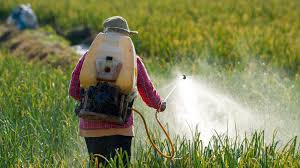Content of the Article
The organic food market is growing globally every year. People's turn to organic foods is an important part of their efforts to live a healthy life. Factors such as personal health and environmental concerns are also leading this change. Organic food is grown healthily. Also, people think that organic foods have a richer nutrient content than non-organic foods. So is it really so? What is the difference between organic foods and non-organic foods?

Now let's talk about the characteristics of organic foods and non-organic foods. Next, let's examine the difference between organic foods and non-organic foods.
What Are Organic Foods?
Organic foods are agricultural products grown without the use of fertilizers, pesticides, genetically modified organisms, sewage sludge or radiation. In meat, egg or milk producing animals and cattle, the term organic refers to those that are not given antibiotics or growth hormones.
In other words, organic foods are grown in environmentally friendly methods. For example, toxic substances or harmful chemicals are not applied to plants to accelerate growth. Genetically modified organisms are not fed to animals. Organic feeds are given. These cultivation methods provide people around the world with a safe, chemical-free dietary option.
Benefits of Organic Foods
- According to one study, organic foods contain higher levels of antioxidants. Organic dairy products have high levels of omega-3 fatty acids and organic meats have improved fatty acid levels.
- toxic metals such as cadmium and pesticides Other harmful chemicals such as residues are at lower levels.
- Sourcing meats organically reduces exposure to resistant bacteria that have become immune to antibiotics.
- Organic farming practices support the reduction of environmental pollution. It helps improve soil and water quality and support natural livestock behaviour.
Negative Aspects of Organic Foods
- Not all foods labeled organic are considered healthy. For example, if cookies are made from organically produced flour and high amounts of organically grown sugar, they will still be unhealthy due to their high sugar, calorie, and fat content.
- Organic foods, which are the result of intensive labor and time, are more expensive than non-organic foods.
- While organic foods are safer due to growing and processing techniques, they still contain ingredients like conventional or non-organic foods. Food allergies are due to certain proteins in foods, not artificial chemicals. Therefore, it causes allergic reactions in people who are allergic to organic foods.
- Organic foods do not reduce the risk of certain chronic conditions such as obesity and diabetes, as there is little variation in nutrients such as protein, fat, carbohydrates and fiber. Therefore, high consumption of organic foods causes weight gain in the same way as high consumption of non-organic foods.
What Are Non-Organic Foods?
Non-organic foods refer to food products such as fruit, vegetables, and meat that are grown using synthetics such as pesticides, pesticides, and chemical fertilizers. It also includes meat products that have been genetically or molecularly modified by manufacturers.
Non-organic foods are grown through non-organic agriculture, where the producer can hybridize crops to produce high-quality fruit and vegetables.
Benefits of Non-Organic Foods
- Its nutrient content is almost the same as organic food.
- Using synthetic materials to grow non-organic food prevents the growth of potentially harmful mold and bacteria.
- Pesticide levels found in many non-organic fruits and vegetables are limited. It does not pose any threat to human health.
- Non-organic foods provide high quality, long-lasting and affordable food products.
Negative Aspects of Non-Organic Foods
- Long-term consumption of such foods can cause endocrine problems and neurotoxicity.
- Long-term use of pesticides increases the number of antibiotic-resistant bacteria.
- Pesticides in non-organic foods increase the risk of certain types of cancer, such as leukemia, prostate, lung, breast and skin.
- Inorganic agriculture increases environmental pollution due to pesticide residues.

Difference Between Organic Foods and Non-Organic Foods
Organic foods do not contain pesticides. It is naturally grown. It does not pollute the environment. It contains high levels of macronutrients such as omega-3 fatty acids and antioxidants.
On the other hand, non-organic foods grown using pesticides up to certain rates can pollute the environment with long-term use. But it contains almost the same amount of micronutrients as protein, fat and fiber as organic foods.
Are organic foods healthier?
Researchers are still in a dilemma about whether organic or non-organic foods are healthy. This is because both have some benefits and downsides. However, it is certain that organic foods will be healthier because they are grown naturally.
References: 1










